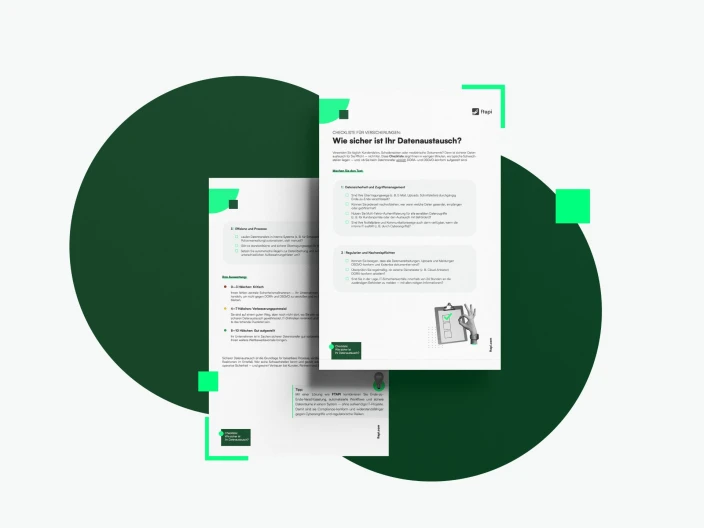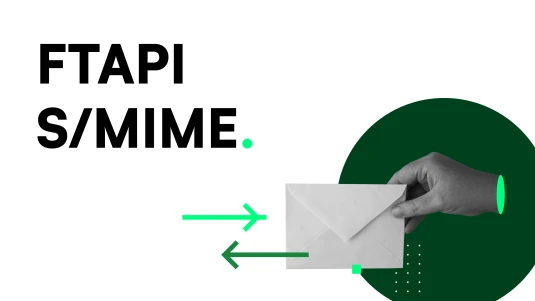DORA: Implement strategically and boost efficiency.
Since January 2025, the DORA regulation has been mandatory. With FTAPI, you can efficiently implement one of its key components: secure, traceable data exchange with clients, partners and authorities.
DORA at a glance. What the regulation requires and who needs to comply
What does DORA require?
The Digital Operational Resilience Act (DORA) sets requirements in five key areas:
• ICT risk management: Identify and mitigate ICT risks at an early stage.
• Reporting obligations: Report cyber incidents within 24 hours.
• Third-party management: Oversee IT providers and ensure contractual security.
• Resilience testing: Run regular pentests and emergency response exercises.
• Governance: Define clear responsibilities for cybersecurity and crisis response.

Who is affected?
All companies in the financial sector are subject to the regulation, including:
• Banks and credit institutions
• Insurance companies
• Payment service providers
• Crypto asset service providers
• ICT service providers (e.g. cloud providers)
Insurance companies are particularly affected. They handle highly sensitive health data and frequently collaborate with external service providers. This significantly increases the demands on IT security and ICT risk management.

Why act now?
2× more
reported security incidents in the financial sector in 2024 compared to 2023.
Up to 2%
of annual turnover in fines for non-compliance.
1 January 2025
was the deadline for full implementation of DORA requirements.
Looking for more information on DORA?
Our guide provides a concise overview of who is affected by DORA, what measures are required, and how compliance and efficiency can go hand in hand.
Implementing DORA: Where IT security meets efficiency.
Secure data exchange is more than just a compliance issue. DORA demands structured documentation, protected interfaces and clear contingency plans.
The opportunity: By implementing DORA, you can modernise outdated processes – and increase your efficiency.
Our DORA checklist for insurance and financial companies helps you identify typical vulnerabilities in just a few minutes – and shows you how to design your data exchange to meet both DORA and GDPR compliance requirements.

DORA compliance for insurance providers – with FTAPI.
FTAPI enables you to transfer sensitive data securely and in full compliance – without a jungle of disconnected tools. Your benefits at a glance:
• Encrypted communication with clients, partners and public authorities
• Secure data rooms for internal and external collaboration
• Structured uploads for use cases such as claims reports and contract documents
• Automated workflows for processing, archiving and documentation
With FTAPI, you meet DORA requirements for data exchange in a secure, traceable and streamlined way. Instead of relying on isolated tools, you benefit from an integrated platform – made and hosted in Germany.

Frequently asked questions.
DORA stands for the Digital Operational Resilience Act. This EU regulation requires companies in the financial sector to make their digital processes crisis-proof and resilient – including ICT risk management, incident reporting procedures and secure data exchange.
Yes. Since 17 January 2025, DORA has been legally binding across the EU for all affected organisations. National supervisory authorities – such as BaFin in Germany – are responsible for monitoring compliance.
In addition to banks, insurers and payment service providers, DORA also applies to many IT service providers, cloud providers and crypto start-ups.
Violations of DORA can result in fines of up to 2% of global annual turnover, reputational damage and operational risks – for example, due to undocumented security incidents or insufficiently protected interfaces.
Currently, no official certification is required. However, companies must be able to demonstrate compliance at any time – for example, through audit logs, process documentation or validated infrastructures.d

Discover more.

Blog
More efficient data exchange thanks to DORA.
Discover how insurance companies can use DORA requirements to make their processes more secure and much more efficient.

Industry solution
Secure data exchange in the insurance sector.
How to exchange data with your customers, partners and suppliers in a way that is both simple and secure.

Blog
From risk to resilience – with DORA.
Those who invest in resilience and secure processes today gain compliance – and future readiness. Why? Find out here.

Blog
Cybersecurity for the financial sector.
Learn what financial and insurance companies need to know about the Digital Operational Resilience Act.







